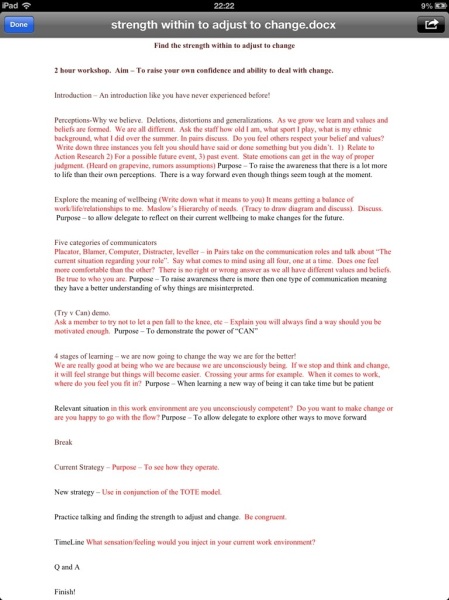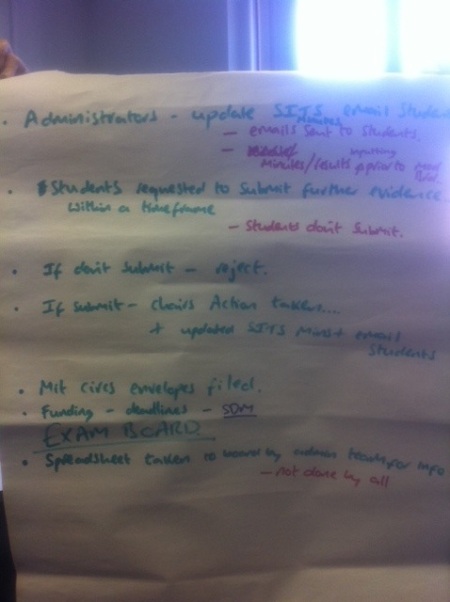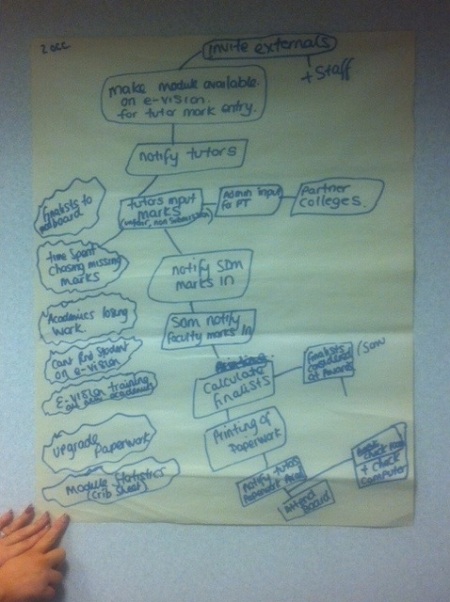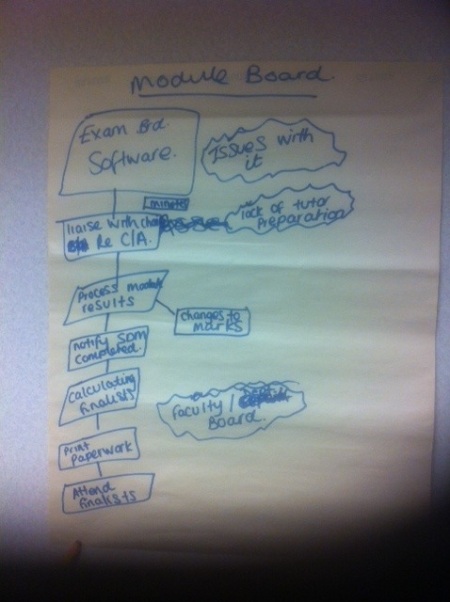Evaluation of the Project
Action Researchers perspective on the value of their involvement in the project
It was decided to host an event to celebrate the commitment that the administrators had made to the project and use this an opportunity to evaluate the project from their perspective.
A questionnaire was devised with 8 questions.
The responses to the questions (as they appeared) are shown by following the link below. Duplicated responses have not been included but I have tried to capture the overall emphasis of response in the summary below.
Evaluation of Process Review Feb 2013
Summary
It is evident from the responses that the project was, on the whole, a positive experience for all involved. As well as bringing about holistic change of benefit for the organisation also served as a conduit for administrators to learn new transferable skills to strengthen their ability towards flexible team working.
A strong message that emerged was that participants really valued collaborating with their peers across the organisations to find common ground and possible ways forward to streamline existing processes. It became apparent that the strong commitment was due to the participants feeling as though they had sufficient opportunity to share opinion and contribute to change that directly affected their working practices.
It was also evident from the responses that not all participants were lucky enough to have a process that went through the full change cycle and this impacted on their view of whether the experience had been enjoyable.
Jisc Enterprise Architecture, Emerging Practices Webinar (16th January)
The outcomes of the Process Review project were presented as part of the Jisc Emerging Practices series of webinar, taking an enterprise architecture perspective.
Outcomes
At the end of the project, each action research group was at a different stage in terms of outcomes for their process review.
Action Research Group 1 – Applications Process
To date, this group have achieved the following:
- Mapped the orginal process on paper
- Mapped the process digitally
- Agreed on elements for enhancement
- Invited the Admissions Team Leader to review the proposed enhancements
- Remapped the process digitally following further adjustments.
The process has now been modified and has evolved from being a predominantly manual administrative process to a virtually online process. This has been made possible by incorporating application and interview details for prospective students in the SITS Student Database and then running a report through Microsoft Reporting Services that sends a weekly email to all those involved in student recruitment to allow them to view current application and recruitment data. It is then possible for those involoved to enter data, via an online portal, to indicate success of application, and associated information, which is captured and imported into the student database automatically.
Following this change, all those administrators and academics involved with interviewing and processing applications for prospective students have undertaken training.
The following documents were used in the training, to provide a simple explanation of the old and new process.
Interviewing/Application Process 2013-14
Activities associated with applications and interviewing
Action Research Group 2 – Mitigating Circumstances Process
Details of the Mitigating Circumstances Process Review Journey
Action Research Group 3 – Exam Board Process
To date, this group have achieved the following:
- Mapped the orginal process on paper
- Mapped the process digitally
- Agreed on elements for enhancement
The work of this action research group can not be concluded at this time, as their proposals involved potential modifications to the database software used to display and record exam board activities and this was not seen as a business critical area for review at this time. Another contributing factor that has caused the research to be halted is the changing positions and roles of the identified stakeholders due to restructuring activities.
Dealing with Change and Uncertainty
A radical restructure of roles, including academic and administrative departmental structures has been scheduled for the university over the next few months and this has come as a bit of a blow to the action researchers. The project is at a crucial stage – one process has successfully been presented to stakeholders, reworked and changes planned. The other two are on the verge of presentation to stakeholders but there is now an impasse due to lack of clarity about future stakeholder and administrator roles and responsibilities.
This has created a tension, frustration and a potential nervousness over future activities. It is important that the good work is not undone and that individuals motivation and commitment is maintained at this unsettling time.
Hence, as Project Manager, I decided to take the opportunity to bring all action researchers back together to celebrate what has been achieved so far and provide the researchers with some techniques to deal with the anticipated changes that lie ahead. The occasion will also provide individuals with the time and space to evaluate their involvement in the project and feedback challenges and barriers to success that they envisage at this stage.
An outline of the activity is shown below:
A copy of the evaluation questionnaire is shown below:
INDIVIDUAL EVALUATION OF THE PROCESS REVIEW AND ENHANCEMENT PROJECT AT UNIVERSITY OF BOLTON 2012
Stages of the Action Research Process Review for Mitigating Circumstances
Some of the steps taken during the Mitigating Circumstances Process Review are outlined below:
April – Determining the Stakeholders
Mapping the process – as is:
Notes from Meeting – March 2012
Mapping the process – proposed:
Proposals for change – May 2012
The action researchers can be seen proposing the changes to the stakeholders below
Following the meeting, and further research, the proposals were modified:
Mit Circs Proposals – September 2012
A new Mitigating Circumstances Envelope was also developed:
Mapping the Processes
The JISC Process Mapping InfoKit was used to educate the project team on process mapping. There were three types of approaches to process mapping that were discussed. There were three teams of seven to eight administrators in each action research group. Each group eventually decided on a preferred approach to documenting their processes, but ideally using flow diagram, on paper.
This was the first iteration of a mapped process using Archimate. These steps were captured by the a group of eight administrators in this action research group.
This process is managed by the administrators following receipt of the student’s application.
Following the process mappings, a process modeller used Archi to digitally map the processes.
Archi, is an open source modeling tool that uses ArchiMate to create architecture diagrams. Archi, was developed by the University of Bolton, as a support, and entry-level tool for Enterprise Architecture.
This is a process that was mapped using Archi:
The first meetings of the action researchers
The first meetings of the action researchers involved an overview of the following and was facilitated by the Project Manager:
- the role of the project facilitators
- the role of the action researchers
- the role of the team leader
- the project and project timeline
- the JISC tools and infokits to be used
- the method of communication and recording activities
Training Needs Analysis
A training needs analysis of the skills needed by the administrators to participate in the project was undertaken by the staff development team. The analysis determined the following skills as being essential:
- action research principles and research skills
- process mapping skills
- working as a member of a project team
- conducting meetings, chairing and minute taking
- use of the Moodle VLE for recording and sharing project activities internally
- writing and presenting business change proposals
- influencing and negotiating skills
- affecting change – both organisationally and individually
It was decided that administrators could opt in to personal development during the project, depending on their own perception of individual needs. However, with action research and process mapping skills being imperative, it was decided that a training session would be offered prior to the start of the project.









